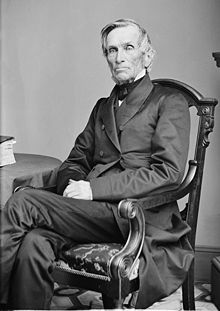Theodore Frelinghuysen was an American politician who represented New Jersey in the US Senate. He was the Whig vice presidential nominee in the election of 1844, running on a ticket with Henry Clay.
He was born on this day in history in New Jersey, where he established a law practice after graduating from the College of New Jersey (now Princeton University).
He became Attorney General of New Jersey in 1817; turned down an appointment to the New Jersey Supreme Court; and became a United States Senator in 1829, serving in that capacity until 1835.
As a senator, he led the opposition to Andrew Jackson’s Indian Removal Act of 1830. His six-hour speech against the Removal Act was delivered over the course of three days, and warned of the supposed dire consequences of the policy:
How shall we justify this trespass to ourselves? Sir, we may deride it, and laugh it to scorn now; but the occasion will meet every man, when he must look inward, and make honest inquisition there. Let us beware how, by oppressive encroachments upon the sacred privileges of our Indian neighbors, we minister to the agonies of future remorse.”
Jackson supporters chided Frelinghuysen for mixing his evangelical Christianity with politics, and the Removal Act was passed.
At the 1844 Whig National Convention, competing with Millard Fillmore, John Davis and John Sergeant, he was selected as the Whig vice-presidential candidate. He took the lead on the first ballot and never lost it, eventually being chosen by acclamation. The Whig presidential candidate, Henry Clay, was not present at the convention and expressed surprise upon hearing the news.
Frelinghuysen’s previous opposition to Indian removal may have put off southern voters. He was was also unpopular with Catholics because groups of which he was a member, such as the Protestant American Bible Society, promulgated the idea that Catholics should convert to Protestantism. Clay and Frelinghuysen lost the 1844 election.
Frelinghuysen, who called himself a “Christian Statesman” may have been respectful of the “sacred privileges” of Native Americans, but he was not so respectful of any rights for Black slaves. He declared that “nine-tenths of the horrors of slavery were imaginary,” and that emancipationists were “seeking to dissolve the Union.”
He feared that abolitionism “would be the madness of self-destruction” since slaves would want revenge (in spite of horrors being “imaginary”). In his public advocacy for colonization, or the deportation of free people of color from the United States, Frelinguysen described Black people as “licentious, ignorant, and irritated” and therefore not suited for full citizenship within their present country.
He died in New Brunswick, New Jersey, on April 12, 1862, and he was buried there at the First Reformed Church Cemetery.





Leave a comment